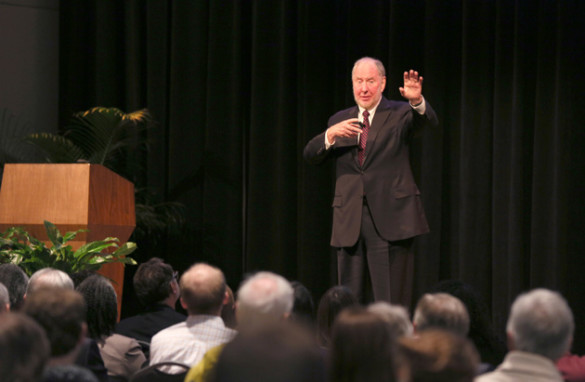
Some 40 years ago, children born to families belonging to the upper third of American society and those born to families on the lower third of the economic scale had roughly equal chance of achieving success in life. Not so any more, said Harvard University political scientist Robert Putnam Monday evening at the Student Life Center.
The primary factor delineating the two groups? Whether their parents, and subsequently they, earned a college degree.
Putnam discussed the research behind his latest book, Our Kids: The American Dream in Crisis, as part of the Vanderbilt Chancellor’s Lecture Series Nov. 28.
“For American kids coming from the upper third of society, they’re doing better than ever in terms of the opportunities and the resources available to them,” he said. “At the same time, by the same measures, kids from the lower third of American society—what we used to call the ‘working class’—their opportunities and the resources available to them have been sharply declining.”
One reason is the economy. “The rich have done well over the last 30-40 years—really well the last 10 years,” Putnam said. “While people from the median income to the bottom basically haven’t had a real raise, an inflation-adjusted raise, in the last 30-40 years.”
Another reason is our increasing segregation by social class—much more so than by race or religion, as in the past.
“Increasingly we are divided into rich folks, who are living only among other rich folks, and poor folks, who are living with other poor folks,” he said. “Fewer of us are living in mixed- or moderate-income neighborhoods. [rquote]We are increasingly physically divided into the ‘have a lots’ and the ‘have nots.’[/rquote]
“That basic segregation, in terms of where we live, has an important effect on the rest of our lives,” he said.
A third reason is the diminishing social ties between the upper and lower classes. Young people are more likely to attend school with, meet and marry other young people from the same social class. “The human ties that used to link us—not perfectly—but used to link us across social class lines are increasingly broken,” Putnam said. “That means the two groups are less likely to have any idea what life is like for the other than they would have understood a generation or two ago.”
This shift has been felt much more acutely among the working class, he said. “The family and community ties that used to be very strong in working-class America, those ties have more or less collapsed—so there’s been a collapse of family and community in working-class neighborhoods,” he said.
As a result, today’s children of the working class are less likely to marry and more likely to experience loneliness, social isolation and distrust of others. But they’re just as likely to have children, and their problems are often repeated and even compounded in future generations.
“Increasingly in America, kids from (the poor) side of town are alone and don’t trust anybody,” Putnam said. “They don’t trust their family, because they’re increasingly living in fractured and fragile families. They don’t trust their neighbors, because they’re increasingly concentrated in poor neighborhoods. They don’t trust their teachers, because they’re increasingly concentrated in poor, low-income schools. … They are alone, and they know it. To use a technical term, they are pissed.
“[lquote]But here’s the deeper point: These kids are alone, and being alone affects both their outlook on life and their own life chances,” he said.[/lquote]
How can parents of working-class families attempt to combat this isolation?
“Parents can invest in their kids in one of two ways,” Putnam said. “You can invest money, and you can invest time.” Interacting with children from a young age through reading or play can pay dividends in terms of their social development.
“What we’ve learned in the last five, 10, 15 years is that … our brains are biologically programmed to develop through social interaction—what pediatric neurologists call ‘serve and response,’” Putnam said. “The longer a child goes without that critical stimulation, the harder it is for them to get on to a different track.
“Those early experiences of interacting with adults in that kind of personal setting turn out to have powerful long-term implications even for things that might seem like they’re genetic,” such as IQ or how children perform on aptitude tests, he said.
Another sound investment is the family dinner. “It turns out that having dinner with your children and saying, ‘How did your day go?’ can have a real effect … on a kid’s success in life,” he said.
Putnam’s talk was co-sponsored by Vanderbilt’s Department of Political Science, with generous support provided by the Mary L. Armistead Fund for the Norman Thomas Lecture Series.